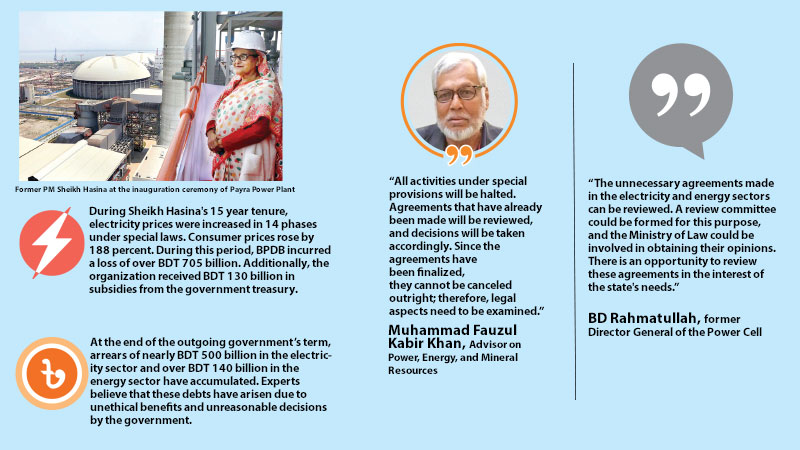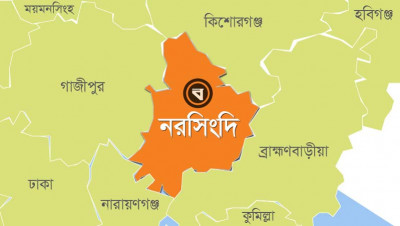 Photo: Bonik Barta
Photo: Bonik Barta The interim government has announced that all completed
projects and agreements in the electricity and energy sector during the tenure
of outgoing Prime Minister Sheikh Hasina will remain in effect. At the same
time, ongoing and under-review projects have been temporarily suspended.
However, sector experts say that implementing these projects has increased
consumer burden and disrupted government revenue. Keeping electricity prices at
a manageable level will be impossible without amending the agreements of
current projects.
Since 2010, the AL government has raised electricity
prices in 14 phases under special laws to increase capacity in the electricity
sector. This has led to a significant increase in consumer prices, with prices
for consumers rising by 188 percent. Despite this, from the 2008-09 fiscal year
to 2023-24, the Bangladesh Power Development Board (BPDB) has incurred a loss
of over BDT 70.5 billion from electricity sales. Additionally, the organization
has received BDT 130 billion in subsidies from the government treasury.
The outgoing Awami League government was compelled to
issue special bonds to settle the debts of the electricity supply companies. Over
nearly a decade and a half, buyers in the electricity and energy sector have
fallen into massive financial debt, with many companies going bankrupt. In this
context, the Ministry of Power, Energy, and Mineral Resources has announced
that all projects and agreements implemented under special laws will continue.
However, activities under these laws will be temporarily suspended.
In a press release on Sunday, the Ministry of Power,
Energy, and Mineral Resources announced that all types of negotiations, project
assessments, processing, and procurement planning activities under the
Electricity and Energy Rapid Supply Enhancement (Special) Act, 2010 (amended
2021) will be temporarily halted. However, all activities under agreements
already executed under this law will continue. Further decisions will be taken
after informing the Advisory Council.
Various decisions in the electricity and energy sectors
during Sheikh Hasina's tenure led to substantial financial debt in the
country's energy sector. By the end of the outgoing government's term, arrears
of nearly BDT 50 billion in the electricity sector and over BDT 14 billion in
the energy sector had accumulated. These debts have arisen from the
government's unethical benefits and unreasonable decisions. Experts suggest
that to revitalize the electricity sector, the agreements made during the AL
administration should be reviewed.
BD Rahmatullah, former Director General of the Power
Cell, told Bonik Barta, "The unnecessary agreements made in the
electricity and energy sectors can be reviewed. A review committee could be
formed for this purpose, and the Ministry of Law could be involved in obtaining
their opinions. There is an opportunity to review these agreements in the
interest of the state's needs."
Muhammad Fauzul Kabir Khan, Advisor on Power, Energy, and
Mineral Resources, briefed journalists at the Secretariat on Sunday. He stated
that agreements made under special provisions will be reviewed. However, the
activities of ongoing projects under this law will be halted.
After a meeting, Muhammad Fauzul Kabir Khan told
journalists, "All activities under special provisions will be halted.
Agreements that have already been made will be reviewed, and decisions will be
taken accordingly. Since the agreements have been finalized, they cannot be
canceled outright; therefore, legal aspects need to be examined."
Regarding the cancellation of the special law, the
advisor said, "We need to discuss this with the Advisory Council.
Decisions will be made based on the overall situation. However, whatever
decision is taken, it will reflect the expectations of the people."
From 2009 to 2024, 91 new power plants were approved in
the electricity sector alone under special laws. Out of the 154 power plants in
the country, nearly two-thirds were established under this law. Notably, rental
and quick rental power plants in the electricity sector were built under this
law between 2010 and 2011. During the Awami League government's tenure, various
business groups extended the duration of these plants from the original two and
five years to 10 to 15 years. It is alleged that these costly power plants were
operated more for business advantages than for electricity production.
Subsequently, many businesses made substantial profits by constructing oil and
gas-based power plants. According to former State Minister for Power, Energy,
and Mineral Resources Nasrul Hamid, capacity payments of BDT 105 billion were
made in the electricity sector over the past 15 years. Among these, ten
companies received the highest capacity charges, including Summit Group, United
Group, Bangla Cat, RPCAL, KPCAL, and Mohammadi Group. These companies received
at least BDT 44 billion more in capacity payments.
During the Awami League government's 15-year tenure, four
gas-based power plants were constructed, with a total capacity of at least 2700
megawatts. Despite uncertainties regarding gas supply, these power plants were
approved between 2018 and 2020. It is alleged that many of these plants were
approved through commissions and political influence. Although these power
plants were built with significant investment, the gas supply is still
uncertain. If these plants cannot be supplied with gas in the future, BPDB will
have to pay a substantial amount in capacity payments for keeping them idle.
According to sources from the Power Division, three power
plants with a total capacity of about 1,900 megawatts in Meghnaghat,
Narayanganj, are waiting for entire gas supply. Among these, Reliance Power, an
Indian company, has built a 718-megawatt plant; Summit Group, a private entity,
has constructed a plant with a production capacity of 583 megawatts; and Unique
Group has developed another plant with a capacity of 584 megawatts in the same
area. The Reliance plant operates as a simple cycle, while the other two are
combined cycle (oil and gas-fired) power plants. Additionally, there is an
800-megawatt gas-based power plant in Rupsha, Khulna. Under major gas
agreements this year, the outgoing government had planned to supply gas to
these power plants by 2026.
To increase the country's electricity generation
capacity, five power plants with a total capacity of at least 5500 megawatts,
including ultra-supercritical technology, are currently operational. Despite
being commissioned under agreements made between 2009 and 2017, these plants
have not been able to produce electricity continuously. Mechanical failures,
financial shortages, and coal supply issues have led to interruptions. It is
estimated that at least BDT 35 billion could have been saved with these plants.
These power plants were constructed with substantial loans from various
countries. They include the 1,320-megawatt plant in Rampal, Bagerhat; 1320
megawatts in Payra; 1320 megawatts in Banshkhali, Chattogram; 1200 megawatts in
Maheshkhali, Cox's Bazar; and a 307-megawatt plant in Barishal.
In light of the country's projected electricity demand,
BPDB has not been able to make effective use of these power plants, which were
constructed with significant investment. Instead, due to having more capacity
than demand, a detailed analysis is needed for the proper utilization of these
plants. Experts suggest that such analysis could help reduce costs and expenses
in the electricity sector.
Shafiqul Alam, Lead Analyst for the Energy Sector at the
Institute for Energy Economics and Financial Analysis (IEEFA), told Bonik
Barta, "The power plants should be analyzed and utilized in a way that
keeps capacity payments to a minimum. The contracts for oil-based power plants
could be re-evaluated to reduce costs. Considering the overall economic
situation of the country, it is important to assess whether there is an
opportunity to review the contracts of other costly power plants."
In addition to fossil fuel-based power plants, the
government has approved the construction of a large number of solar power
plants in the country. Dozens of these power plants have been built over the
past two years. Under special laws, these plants were approved without any
competition. The power purchase agreements for these plants have been set at
least three times higher than those in neighboring India. The price per unit
for the solar power plants currently approved in Bangladesh is not less than
BDT 11 to 12.
The largest solar power plant approved in the country to
date is Tista Solar Limited. It was constructed by Beximco Power Limited, a
subsidiary of Beximco Group, which is associated with Salman F Rahman, former
advisor on private industry and investment to former Prime Minister Sheikh
Hasina. The plant's electricity has been fed into the national grid since
December. The plant was built on 650 acres of unused char land in Sundarganj
Upazila, Gaibandha, in 2017.
To address the gas shortage in the energy sector, the
outgoing Awami League government signed several LNG import and infrastructure
agreements. Summit Group was awarded the contract to build the country's third
LNG terminal in a Cabinet Committee on Economic Affairs meeting last June.
Although the 500 MMCFD capacity terminal has not yet started construction, the
Awami League government also signed a long-term LNG supply agreement with the
American company Excelerate. Additionally, 48 wells are being drilled for gas
exploration under special provisions. However, there are allegations that
Chinese and Russian companies are being paid two to three times more than the
local company BAPEX for these projects.
Energy expert and BUET Professor M Tamim told Bonik
Barta, "It is a positive step to suspend ongoing projects under the
special law. However, the work done under this law should now be examined for
its rationale. This way, the public can determine whether these projects have
financial success in the electricity sector. If not, a proper decision needs to
be made regarding them."






